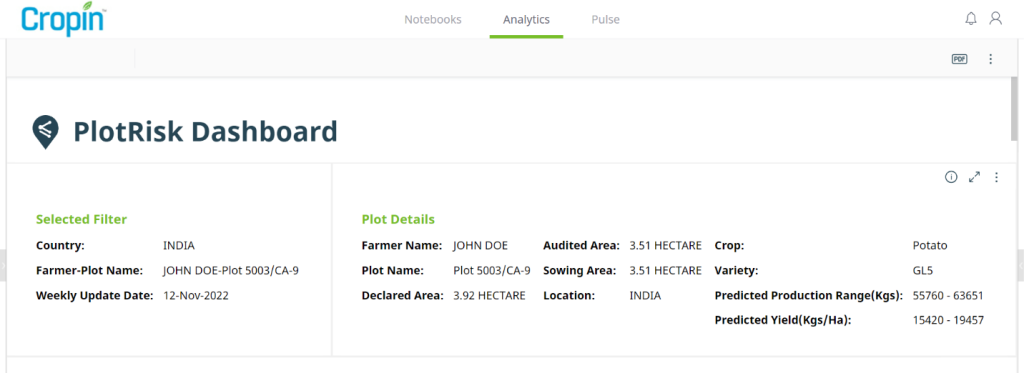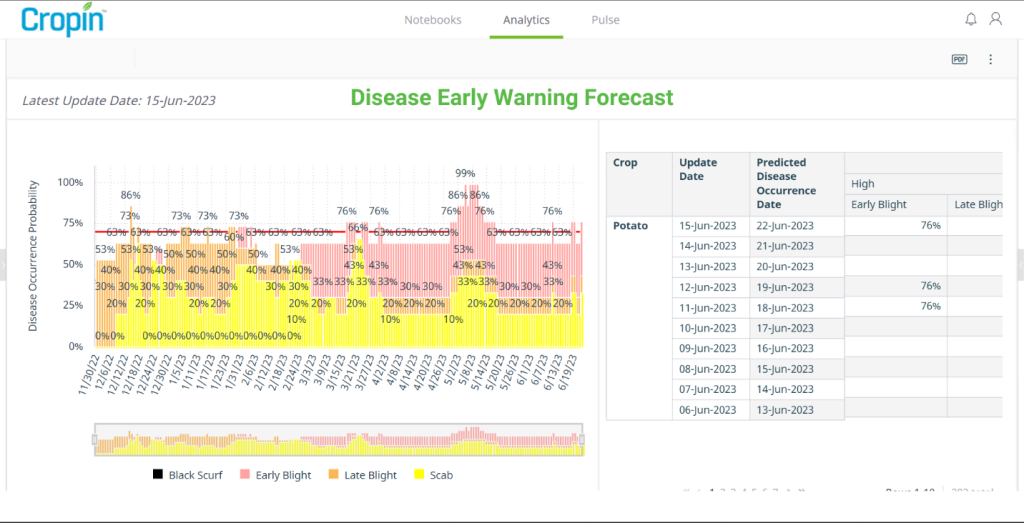我们使用机器学习技术将英文博客翻译为简体中文。您可以点击导航栏中的“中文(简体)”切换到英文版本。
Cropin提高了CPG价值链中的知名度
对于包装消费品(CPG)公司而言,提高价值链的可见性可以帮助他们满足不断增长的消费者期望并遵守标准、认证和监管要求。合规还可以在进入新的海外市场和收入来源方面创造新的机会。由于CPG公司向消费者出售各种产品,因此他们在实现价值链透明度方面面临一些挑战,包括供应链的复杂性、分散的数据和不一致的数据共享。
加快农业生态系统的进步
许多CPG公司从庞大的农民网络中采购原材料,这些农场分布在广阔的地区,尤其是在发展中国家。通常,这些公司会花费大量的时间和金钱派遣现场人员来
这就是
Cropin 与 亚马逊云科技 合作构建了第一个可扩展且安全的智能农业云,以帮助 CPG 公司实现运营数字化。通过诸如
- 通过卫星遥感进行大规模和轻松的独立验证和确证。
-
由使用 亚马逊云科技
机器学习 和数据分析 技术的智能、 互联 数据平台 进行汇总 和分析 。
通过农场管理解决方案套件实现农场数字化,无需人工检查和干预,从而可以近乎实时地对农场进行360度监控。借助 亚马逊云科技 的云功能,Cropin 可以快速扩展,让成千上万的农民加入该平台。在整个种植过程中,向农民传递的数据驱动见解可确保农产品具有最高质量并免受可能损害作物的疾病和害虫的侵害。
在农业中使用技术可以促进对耕地的近乎实时的监控,使利益相关者能够尽早发现任何异常情况,因此

图 1 — 显示绘图参数的 Cropin PlotRisk 仪表板

图 2 — 马铃薯作物病预警预测,涵盖大约 6 个半月
Cropin的技术可以帮助加速
- 可持续地提高农业生产力和收入。
- 适应和增强抵御气候变化的能力。
- 减少和/或消除温室气体排放。
收获 Cropin 技术的好处
Cropin技术的开发愿景是为农业价值链中的每个利益相关者 “最大化每英亩价值”,可为其客户和合作伙伴提供企业级性能。以下是
PepsiCo India通过其
联合利华现场团队使用Cropin的SmartFarm Plus移动应用程序
Loacker部署了Cropin的农场数字化和可追溯性应用程序Cropin SmartFarm Plus和Cropin RootTrace,以
可扩展的解决方案遍布全球
通过数字化从农场到餐桌的农场运营,Cropin正在帮助组织利用近乎实时的数据和切实可行的见解。这不仅可以帮助企业做出更有效的决策,还可以帮助企业遵守(并保持透明)消费者希望看到的标准、认证和监管要求。
政府、非政府组织和其他主要利益相关者可以利用Cropin的人工智能/机器学习引擎在卫星成像数据上绘制历史土地使用情况图。企业可以从这些情报中受益,以核实可持续生产的说法,并做出正确的决定,从不会对环境产生负面影响的农场采购。
通过Cropin的移动应用程序,各组织可以注册每位农民,以使该组织能够验证农场中没有雇用儿童或强迫劳工。可持续生产产品的认证现在可以获得溢价,这可以改善农民的收入和生计。
有兴趣将您的运营数字化吗?详细了解 亚马逊云科技 合作伙伴 Cropin 以及其互联数据平台如何帮助公司解决最复杂的农业挑战。
合作伙伴聚焦
*前述特定亚马逊云科技生成式人工智能相关的服务仅在亚马逊云科技海外区域可用,亚马逊云科技中国仅为帮助您发展海外业务和/或了解行业前沿技术选择推荐该服务。